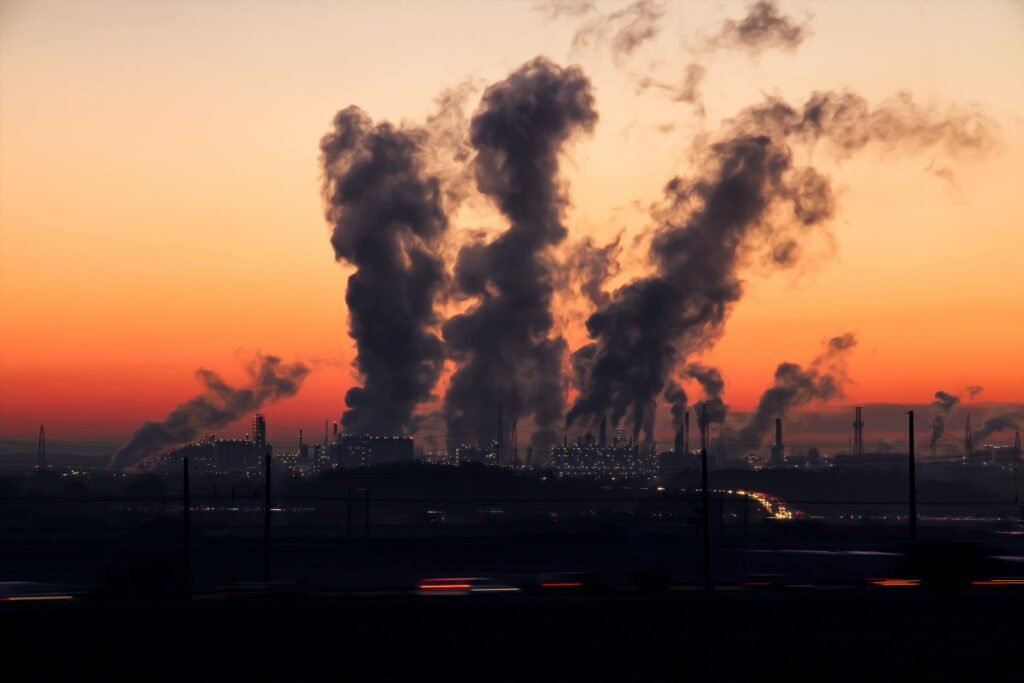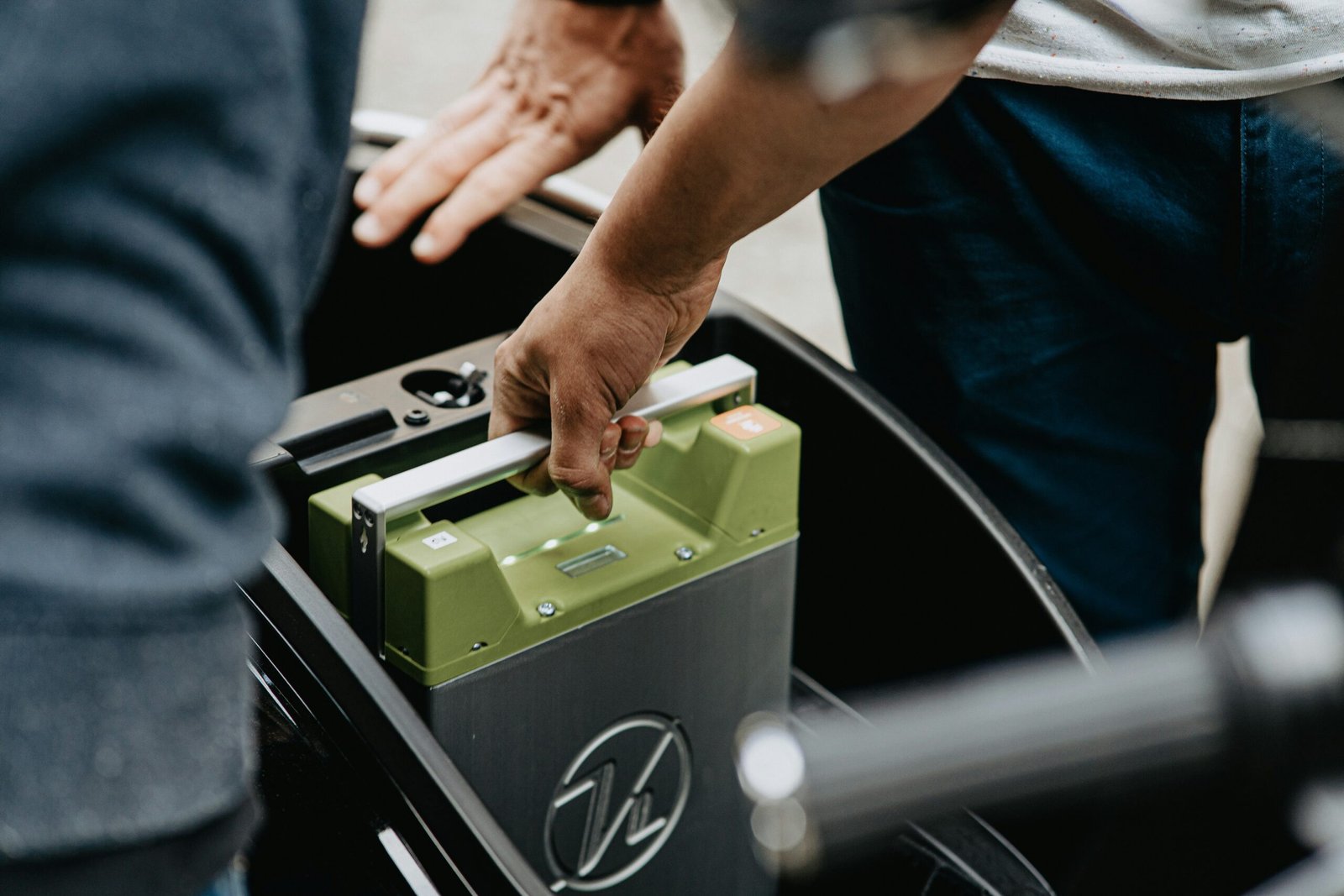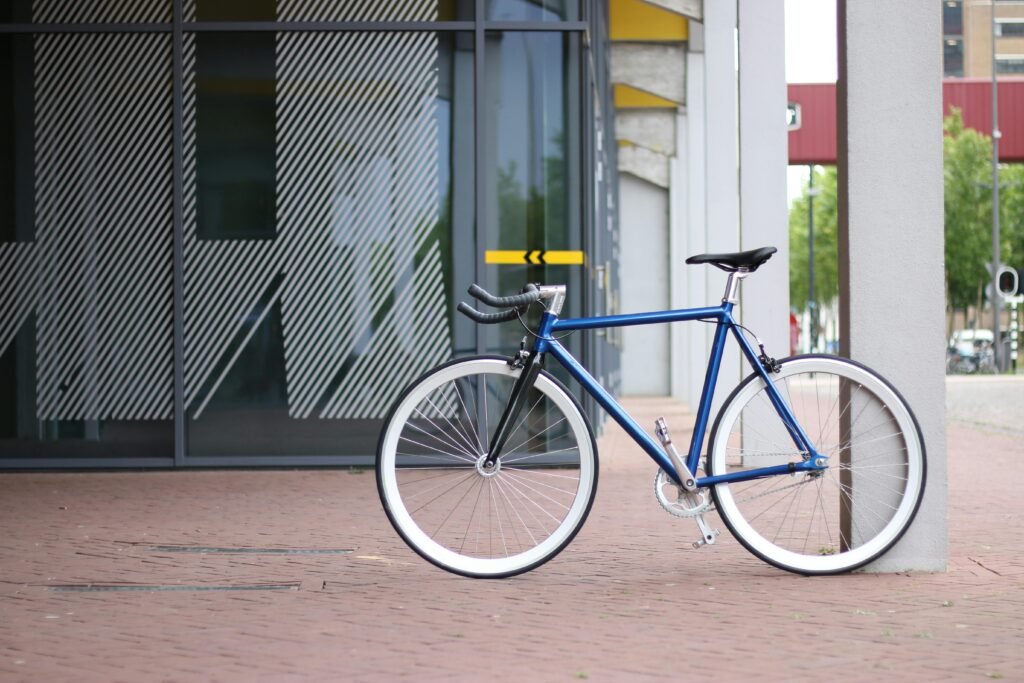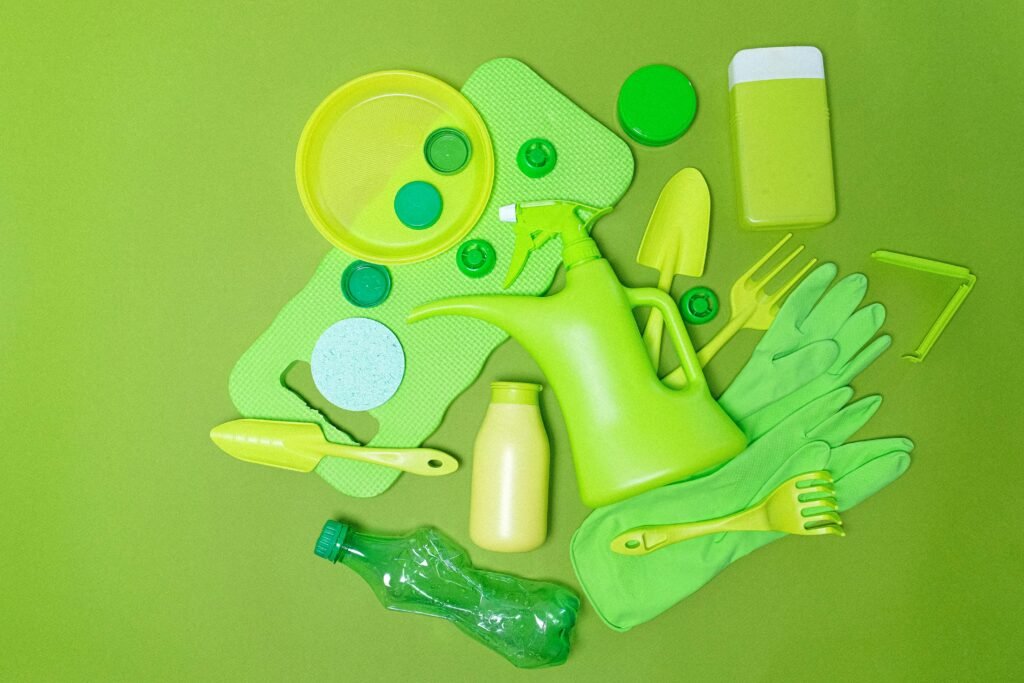
Imagine a world where plastic bottles and bags do not choke rivers or turn into smoky clouds when burned. That is what plastic waste management can do—it takes used plastics and handles them smartly to cut pollution and fight climate change. Plastic junk makes a big mess if we ignore it, clogging oceans, wrecking soil, and warming Earth with gases. But when we collect it, sort it, recycle it, and throw it away right, we stop that trouble. Let us dig into how plastic waste links to climate change, smart ways to manage it, and what we can all do, so you see why it is a big deal and enjoy learning about it.
What Is Plastic Waste Management?
Plastic waste management is how we take care of plastic we do not need anymore. It begins with collecting—grabbing bottles, wrappers, and bags from homes, shops, and streets. Then we sort it—splitting plastics by type, like hard containers or soft films, to make recycling work better. Recycling changes old plastic into new things, like chairs or pipes, so we do not keep making fresh plastic from oil. If some cannot be reused, we dispose of it safe, keeping it out of water and air.
If we do not handle it well, plastic causes chaos. In oceans, it hurts fish and turtles, piling into huge trash patches—like the Great Pacific Garbage Patch, a floating mess bigger than some countries. On land, it sinks into soil, making it hard to grow food. Burning it wrong sends bad stuff into the air we breathe. Because good plastic waste management stops this, it saves nature and cuts greenhouse gases—gases that trap heat—helping us fight climate change.
How Plastic Waste Ties to Climate Change
Plastic waste feeds climate change from beginning to end. Making plastic uses oil and gas—fossil fuels—that take heaps of energy, pumping out greenhouse gases like carbon dioxide that warm Earth. For example, a factory spitting out plastic straws burns fuel just to fill store shelves. Because of this, every new piece of plastic adds to the heat problem.
Tossing it keeps the harm going. Landfills—giant trash piles—hold plastic that sits for years, breaking down slow and leaking methane, a greenhouse gas way stronger than carbon dioxide for a short time. Soil and water get dirty from landfill leaks too.
Burning plastic in incinerators shrinks the pile, but it sends carbon dioxide and poisons like dioxins into the air. In places like India, folks sometimes burn it in open fires, making thick smoke with toxic stuff that hurts health and Earth.
Ocean dumping makes it worse—plastic floats, breaking into bits that harm sea life and keep the cycle messy. So, plastic waste management is key because it hits these climate change troublemakers hard.
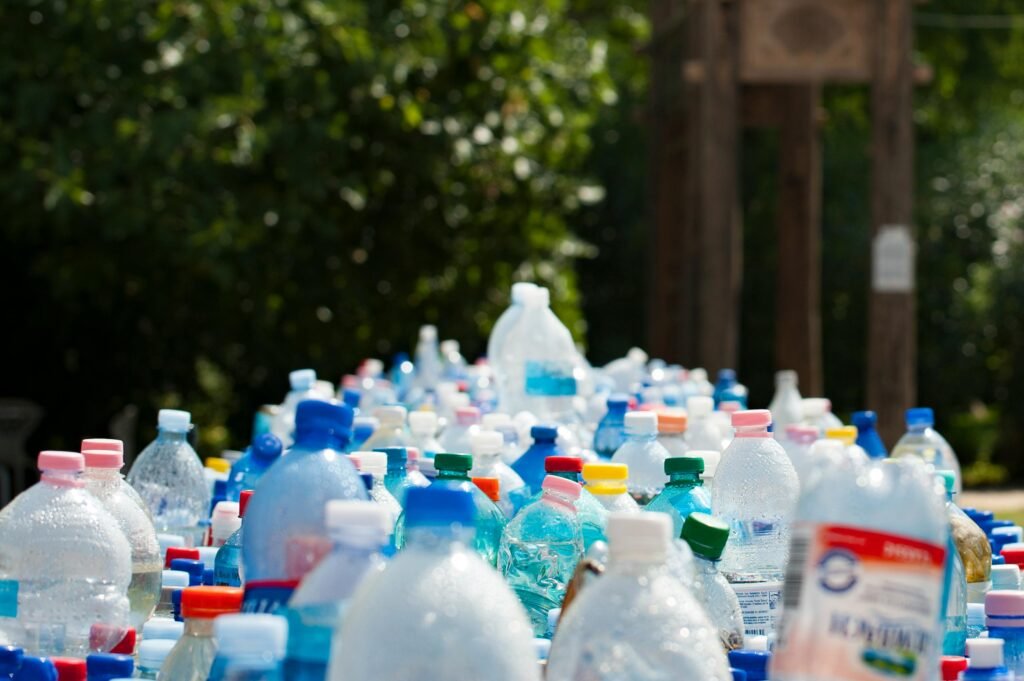
Smart Ways to Manage Plastic Waste
We can tackle plastic waste with simple habits and good systems. Here is how we make it work.
Cut It at the Start
The best way is using less plastic to begin with. Carry reusable bags to the shop, skip single-use cups, or buy things with less wrapping. Companies can pitch in—making bottles thinner or using stuff like paper instead. For example, a store might sell loose fruit, not plastic-wrapped apples. Because this lowers how much we make, it cuts greenhouse gases right away.
Reuse What We Have
Using plastic again keeps it alive longer. Fill a water bottle over and over, or turn old tubs into storage boxes. Some shops let you bring jars back for refills—like soap or grains—so less new plastic gets made. For example, a coffee place might refill your own cup. So, reusing keeps trash out of piles and saves energy we would spend on new stuff.
Recycle It Right
Recycling turns old plastic into something useful. We sort it—like separating bottles from bags—then clean and melt it with mechanical recycling for new goods. Chemical recycling breaks it into tiny pieces to rebuild—like fixing a puzzle—making strong stuff again. Because this skips fresh plastic, it cuts landfill junk and gas from factories.
New Tools and Tech to Help
Tech gives us big wins in plastic waste management. Let us look at some neat ideas.
Better Recycling
Chemical recycling takes plastic back to its basics, letting us make new, good stuff without oil. Pyrolysis—heating plastic without air—turns it into fuel or chemicals, like gas for trucks. Biodegradable plastics, like polylactic acid from corn, rot away natural instead of hanging around forever. For example, a compostable bag might vanish in your garden pile. These tricks shrink how plastic waste affects climate change.
Smarter Systems
Smart bins with sensors show when they are full, so trucks do not waste gas on half-empty runs. Blockchain tracks plastic from shop to bin, making sure it gets recycled, not dumped. Artificial intelligence sorts fast—machines spot plastic types better than people—so recycling is cleaner and quicker. Because these tools save time and fuel, they help Earth stay cool.
Coming Soon
Scientists are coming up with new fixes—like enzymes that eat plastic, turning it safe in weeks. Ocean cleanup gear—like big nets in the Pacific—grabs floating junk before it spreads. Researchers test sea plants for plastics that fade fast too. So, these new ideas make benefits of plastic waste management even bigger down the road.
Challenges We Face
It is not all easy—some stuff slows us down. Sorting takes time, and not every town has bins for it—plastic mixes with food scraps and gets messy. Recycling plants cost money to build, so poor places struggle. Plus, some folks do not care—they toss plastic anywhere. For example, a village might burn it because bins are far. Because these hurdles block us, we need more help to push through.
Money Wins from Managing Plastic Waste
Good plastic waste management brings cash too. Recycling plants give jobs—people sort trash or make new things from old plastic. Companies save money—using less new plastic or energy keeps costs low over time. For example, a bottle maker spends less reusing old stuff than pulling oil from the ground. Towns sell recycled goods—like plastic bricks—making extra funds. So, work grows, and wallets feel good while Earth gets cleaner.
How Businesses Can Help
Shops and factories can step up big. They can design stuff to use less plastic—like thinner wrappers—or switch to bamboo or cloth. Some offer take-back plans—you return old bottles, they refill them. For example, a soda company might take your empties for a discount. Because businesses make so much plastic, their moves cut greenhouse gases fast and push others to follow.
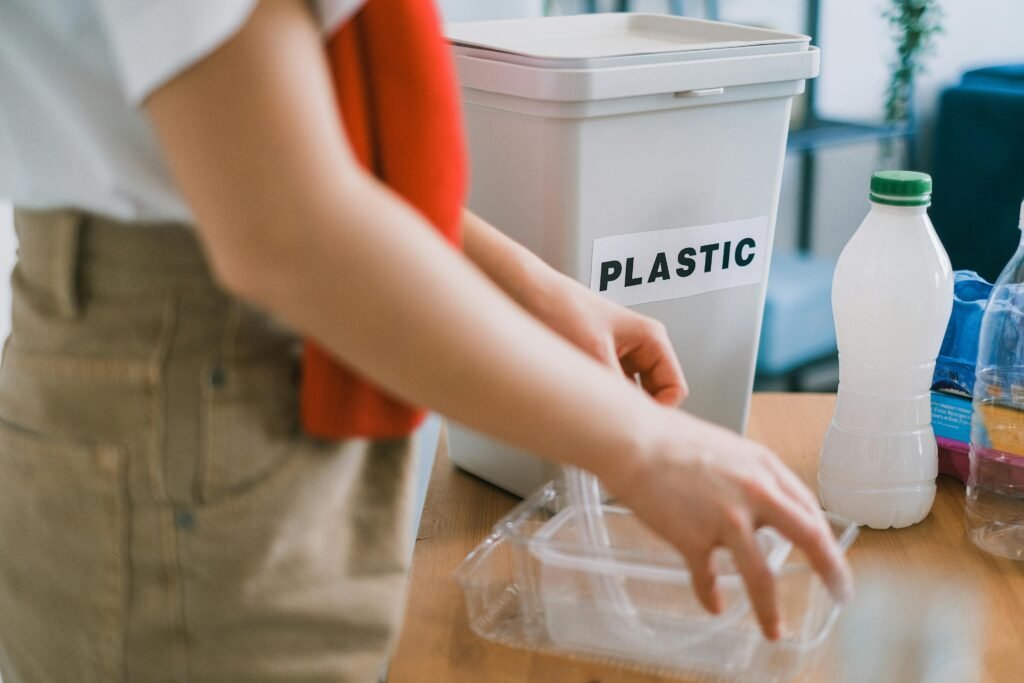
What We Can All Do
It takes everyone—people, groups, and leaders—to make plastic waste management happen.
What You Can Do
Start small—use reusable bags, skip plastic spoons, and recycle what you can. Pick glass over plastic jars or buy stuff with green wrapping—like paper instead of film. Tell friends why plastic hurts—like how it traps sea birds—so they join you. For example, show them a reusable straw you love. Because little steps grow, you cut climate change from your own house.
What Communities Can Do
Groups can work together—clean parks or beaches, teach people to sort trash, or set up drop-off spots. A neighborhood cleanup pulls plastic out and gets folks chatting about it. Local programs—like bins at every corner—make tossing trash right simple, so less hits landfills. In Brazil, towns turn plastic into crafts to sell, funding more green ideas. So, communities build habits that last.
What Governments Can Do
Leaders can set rules—ban plastic bags, tax them, or demand recycling plans. They can pay for new tech—like plastic-eating bugs—or run ads about why it matters. Working with other countries on deals—like ocean cleanup pacts—helps too. For example, Kenya banned bags in 2017, keeping streets clean. Because laws lead us, governments make plastic waste management strong.
Real Examples That Show It Works
See it in action—India’s Pune recycles tons into roads since 2018, cutting landfill gas. Sweden burns trash smart, making heat not smog, for decades. Rwanda banned bags in 2008, keeping gas low and towns tidy. Japan recycles over 80% of its plastic with tight sorting rules—less waste, less heat. Because these places prove it, plastic waste management fights climate change everywhere.
Why It Matters to You
Plastic waste management is your chance to fix climate change. It cuts greenhouse gases from making and dumping plastic, keeps oceans breathing, and saves soil for crops. Less trash means less methane, fresher air, and a cooler Earth. Start easy—grab a reusable cup, recycle a wrapper, push your town to act. Every bit turns how plastic waste affects climate change into a win for us all.
What do you think? Share below—your ideas keep this rolling. Let us tackle plastic waste management together!
Frequently Asked Questions (FAQs)
How Does Plastic Waste Management Help Climate Change?
Plastic waste management helps by cutting gases that warm Earth. Making new plastic uses oil and spits out greenhouse gases like carbon dioxide. Throwing it in landfills or burning it adds methane and more bad stuff. But when we recycle or reuse it, we skip making new plastic and keep trash from leaking gases. So, it cools the planet and fights climate change step by step.
Why Is Recycling Plastic Better Than Throwing It Away?
Recycling plastic beats tossing it because it saves energy and cuts trash. When we throw it in landfills, it sits there, leaking methane—a strong greenhouse gas—and dirtying soil. Recycling turns old bottles into new ones without using more oil. For example, a recycled bag skips factory gas.
It helps nature too—less plastic in oceans means fish stay safe, not tangled. Burning trash pumps out poisons, but recycling keeps air cleaner. So, we get less waste and a healthier planet for us and kids later by choosing to recycle.
What Can I Do at Home to Manage Plastic Waste?
You can do easy things at home to manage plastic waste. Use reusable bags for shopping, skip plastic straws, and pick glass jars over plastic ones. Sort your trash—put bottles in recycle bins, not regular ones. Tell family why it matters—like how plastic hurts birds.
Reuse stuff too—fill old containers with snacks or water instead of buying new. Join a local cleanup if you can—it pulls plastic out fast. Every bit you do cuts gas and junk, helping plastic waste management make Earth better.



